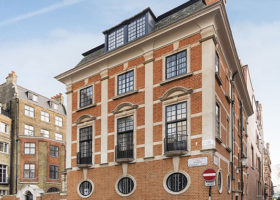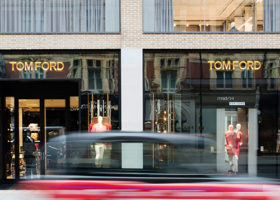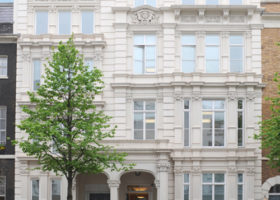View our 2020 Annual Report
Despite a turbulent year, Cadogan performed resiliently in 2020, benefitting from its long-term stance and ability to react swiftly to the pandemic in supporting the community for the long-term recovery of the neighbourhood.
To read the full annual report click here.
Total income from continuing operations reduced to £161.1m (from £171.0m in 2019) and the business experienced a revaluation reduction of -14.2% to £4.8bn, with the fall in values led by retail (-24.6%) and residential (-5.7%).
Activity across the last year was defined by the financial support Cadogan put into place for its operators, partners and community throughout the COVID-19 pandemic. Its Business Community Fund (launched in spring 2020) supported the temporary overhaul of commercial leases for hospitality businesses – placing them on turnover rents – and delivered ongoing financial help, cash flow support and resources to customers and partners, including local charities, to aid Chelsea’s long-term recovery from the impact of the COVID-19 pandemic. To date, it has delivered over £20 million of financial support to over 300 businesses and charities.
Net rental income after COVID-19 related occupier support and impairment provisions for bad debts (together totalling £21.4m) fell by 13% to £143.3m. Retail remains the largest component at 43.8% of the portfolio. Despite the pandemic and the challenges faced by the UK retail and hospitality industries, including accelerating online retail trends, Cadogan continued to complete significant new deals in 2020, welcoming brands including Ralph Lauren, Ganni, Anabella Chan and Off-White to Chelsea. Cadogan also announced two pioneering partnerships – ‘The Beaverbrook Town House’, set to open on Sloane Street this summer with the team from the iconic Beaverbrook country house hotel in Surrey and a pioneering new retail concept with innovative designer Anya Hindmarch, ‘The Village’, a collection of five experiential stores.
In 2020, total expenditure on redevelopment and major refurbishments was reduced to £54.4m (£66.5m in 2019), allowing significant funds to be funnelled into the Business Community Fund. The development pipeline at the end of 2020 still comprised 73 projects with total committed expenditure of £240m and overall pipeline expenditure of £492m to enable major development and public realm improvements to progress, including significant schemes on King’s Road and Sloane Street. 2020 also saw the restoration of 8 historic artist’s studios, ‘Rossetti Studios’ to ensure their intended use was preserved; permanent pedestrianisation of Pavilion Road, Cadogan’s artisan food street, by the Royal Borough of Kensington and Chelsea; and 900 al fresco seats introduced across the neighbourhood to encourage vibrancy and aid recovery of Chelsea’s restaurants and cafes.
Commercial repercussions of COVID-19
Retail remains Cadogan’s largest sector with a value of £2.10bn (43.8% of total value and 50.8% of income) and has felt the impact of COVID-19 most, having been unable to trade for much of the year with gross rental income down 5.1% to £85.3m. This can be seen most visibly in the steep fall in total rental receipts because of rent waivers and potential inability to pay by some occupiers, accompanied by a decline in asset values (down 14.2% overall and retail down 24.6%).
Resilience of the office market
Offices, which represent 15.3% of the portfolio, have proved to be more resilient with a valuation decrease of 1.8% to £733.5m after a modest increase (2.7%) in the previous year. The portfolio has remained largely fully occupied through the year. Office rental income increased by 6.6% to £35.7m (21.3% of the total rent roll).
Residential update
The residential sector represents 31.4% of the portfolio. It was subject to a valuation decline of 5.7% to £1.51bn, after adjusting for purchases, sales and capital expenditure. This follows a steep decline (-10.7%) in 2019. Gross rents for the residential market let portfolio fell by 9.1% to £30.1m, due mainly to a higher than average number of vacates that then took longer to return to market because of social distancing requirements during refurbishment. Adding ground rents from long leaseholds of £2.6m, residential comprised 19.5% of the total rent roll.
Cadogan’s Chief Executive, Hugh Seaborn, also highlighted the pressing need to focus on climate change. He highlighted that the built environment is responsible for 40% of the UK’s carbon emissions each year, and the need for the real estate industry to work together to cut waste, source sustainable materials and reduce emissions through supply chain management.
As part of the results announcement, Seaborn outlined Cadogan’s drive to become net-zero by 2030 and other ambitious environmental plans that are laid out in its Chelsea 2030 report, also released this week, which commits to 12 environmental and social targets and a number of initiatives. This follows extensive consultation with the local community, to understand their concerns and create a clear roadmap for Cadogan to help accelerate positive change.
Hugh Seaborn, Chief Executive, said: “The business has proved resilient despite being significantly impacted by the pandemic. Our well-established strategic responses to the structural change in retail reflects our strength as a business able to take a long-term view, with a strong stake in ensuring the area thrives, and a very clear purpose – to make Chelsea wonderful. Our commitment this year to make the business net-zero carbon by 2030 clearly reflects these values too. From the outset of the pandemic, Cadogan has been proactive, with clear priorities for dealing with the crisis and plotting a path for emerging successfully as the threat to health recedes and restrictions start to lift.”
To read the full annual report click here.




